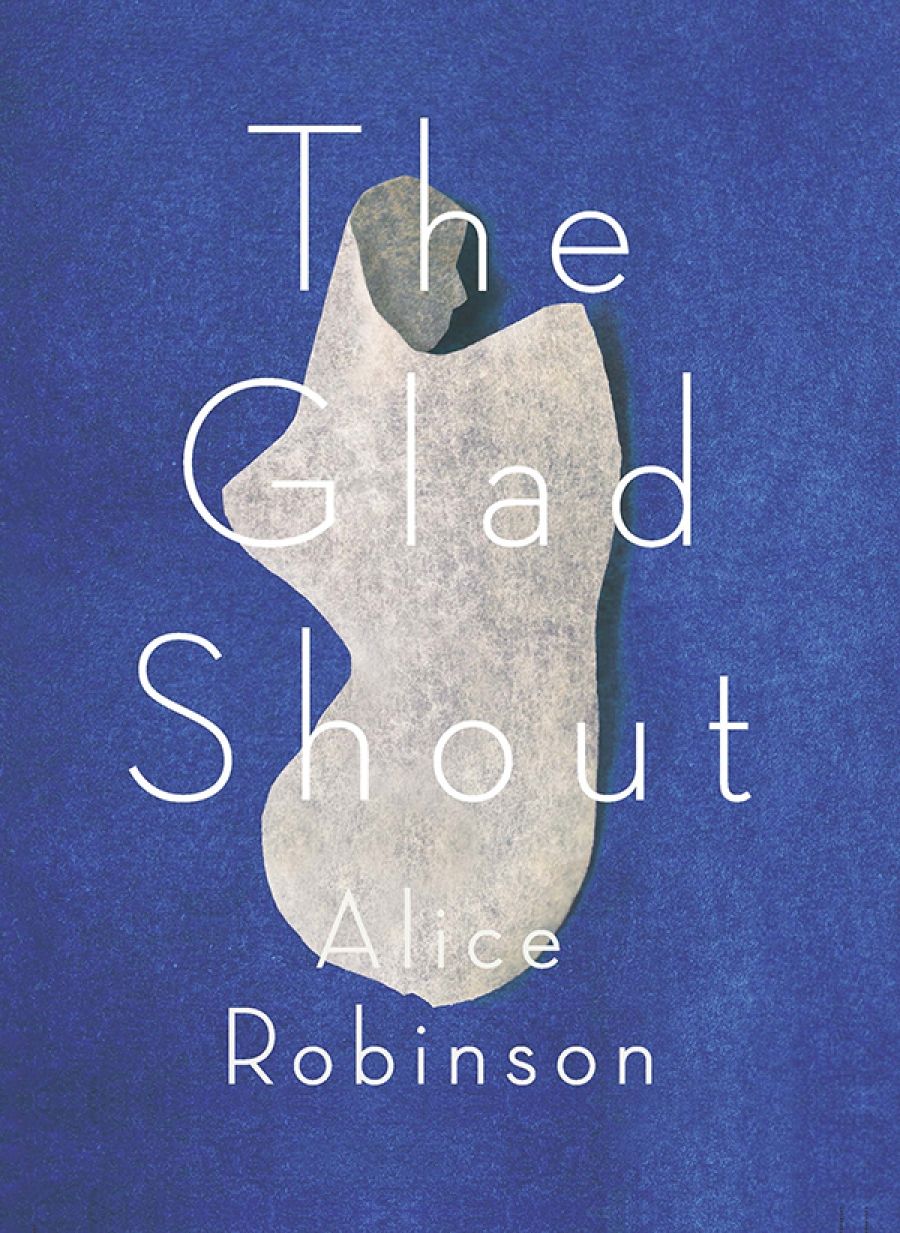
- Free Article: No
- Contents Category: Fiction
- Custom Article Title: Jane Rawson reviews <em>The Glad Shout</em> by Alice Robinson
- Review Article: Yes
- Online Only: No
- Custom Highlight Text:
Unusually for literary fiction, Alice Robinson’s The Glad Shout opens right in the thick of the action: Jostled and soaked, copping an elbow to her ribs, smelling wet wool and sweat and the stony creek scent of damp concrete, Isobel grips Shaun’s cold fingers and clamps Matilda to her hip, terrified of losing them in the roiling crowd ...
- Book 1 Title: The Glad Shout
- Book 1 Biblio: Affirm Press, $32.99 pb, 320 pp, 9781925712650
A parallel narrative follows Isobel’s life, especially her relationship with her mother, Luna, from infancy until the time of the flood. Isobel’s father has left – this is a novel of missing men – and Luna is raising Isobel and her brother Josh alone. Isobel often feels Luna loves interior decoration more than she loves her daughter.
Again and again, Robinson returns to the theme of the painful love and deep resentments between mothers and daughters, turning it this way and that, refusing to sentimentalise the relationship: ‘After an interminable childhood coloured by wanting more of her mother than she was capable of giving, Isobel is painfully aware that she is wasting the time they do have together now wishing Luna away. Is that just what mothers and their children are destined for? To live trapped in a perpetual state of longing?’
This is also a story of the lengths mothers will go to protect their children when times are tough. Luna spends hours at work, trying to give Josh and Isobel a decent standard of living as the city crumbles. All Isobel wants is her mother’s time and approval.
As disaster strikes, Isobel is repeatedly faced with the choice between helping others or helping her daughter, supporting her husband or supporting her daughter. Robinson’s novel is an unflinching investigation of not just the sacrifices, but also the vast protective selfishness that motherhood can bring, where family must always come first. For Isobel, helping others would mean betraying her daughter: it’s not something she is prepared to do.
The Glad Shout is also a novel about climate change and about the ways we cope with the end of the world. Parenting in a time of climate change is not a new theme for novels – see also Megan Hunter’s The End We Start From (2017) and James Bradley’s Clade (2015) – but Alice Robinson has dedicated her writing career to exploring this interface. Her Stella Prize-longlisted début novel Anchor Point (2015), and her brilliant essay ‘Aching for the Apocalypse’ in The Lifted Brow (2015) both investigate the issue. It is something Robinson takes very seriously: she has spoken and written about the tension of understanding the terrible realities of climate change while raising two very young children.
 Alice Robinson (photograph via Affirm Press)In both threads of this novel, we see Melbourne and the rest of Australia collapsing under the weight of multiple climate-change disasters. Isobel’s brother flees to Tasmania before it becomes a militarised state. As Isobel struggles to survive in the evacuation centre, she is offered a chance to escape that means abandoning people she truly loves. Isobel’s life is full of huge losses, but also tragic small ones.
Alice Robinson (photograph via Affirm Press)In both threads of this novel, we see Melbourne and the rest of Australia collapsing under the weight of multiple climate-change disasters. Isobel’s brother flees to Tasmania before it becomes a militarised state. As Isobel struggles to survive in the evacuation centre, she is offered a chance to escape that means abandoning people she truly loves. Isobel’s life is full of huge losses, but also tragic small ones.
‘I would have loved to make fresh pesto for youse,’ Nonno sighs and murmurs, stirring the salsa made from tinned tomatoes on the stove … [he] mutters something about basil and Parmesan cheese, their absences. Isobel catches the sorrow in his face.
Robinson’s grief for the world we risk losing is palpable but always delicate, never didactic or overwrought. The Glad Shout is an immensely sad book, an elegy, but it is also a warning to all of us to prepare. As Robinson writes: ‘Isobel can’t help but feel that some of the hardship she is facing now, in the water, is her own fault. She hadn’t paid attention; hadn’t cared enough to realise that she was being forewarned.’
We should be thankful that Robinson has been brave enough to write this strongly felt, finely crafted novel, laying her own fears and misgivings on the page.


Comments powered by CComment